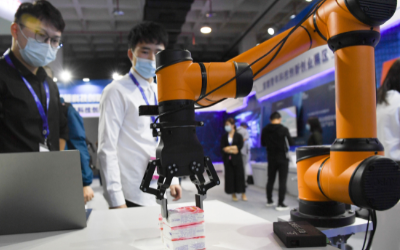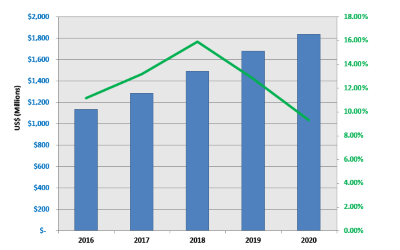Alibaba unit opens intelligent manufacturing facility
Alibaba Group Holding Ltd unveiled a smart manufacturing and digital solutions factory on Wednesday in Hangzhou, Zhejiang province, as part of its smart manufacturing initiatives.
The Xunxi Digital Factory offers small and medium-sized enterprises a digitalized end-to-end manufacturing supply chain that enables fully-customized and demand-driven production.
Powered by Alibaba's cloud computing infrastructure and the internet of things technologies, the facility is representative of the New Manufacturing concept introduced by its founder Jack Ma in 2016. The other four strategies that are being promoted to support the company's next phase of growth are New Retail, New Finance, New Technology and New Energy.
"While sales and marketing have already achieved digitalization and intelligence, we are looking at end-to-end intelligence from manufacturing to sales," said Jiang Fan, president of Alibaba's Tmall and Taobao platforms, its core commerce sites. He hoped the new manufacturing model can facilitate direct employment of 100,000 people by 2025.
"Data is the core of New Manufacturing and harnessing data insights is key to capturing new opportunities in the shift in consumer preferences for personalized rather than mass-produced goods," said Wu Xuegang, CEO of Xunxi Digital Technology Co under the Alibaba Group.
"This allows traditional manufacturers to improve profitability and reduce inventory levels while still being able to meet the personalization needs."
At an early stage, apparel was identified as the starting point for Xunxi. Apparel is a sector in which the lengthy production cycles and high inventory levels have long been a problem for small and large players alike.
Alibaba said Xunxi operations have been under development for three years. It has been piloting flexible production along with 200 small enterprises.
Powered by new technologies such as real-time resourcing, process and cost planning, automated in-house logistics and Xunxi's manufacturing operating system, the factory is able to produce small-batch orders at reasonable costs and with shorter delivery times.
To be more specific, under the new production model, the minimum number of orders has been slashed from 1,000 units to just 100, while the delivery period has been shortened from 15 days to seven days on average.
The company said that Xunxi's trend and sales forecast model alongside its own artificial intelligence-aided integrated product design platform give manufacturers insights into consumer preferences.
"This enhanced information flow can reduce research and development costs and enable businesses to capture the fast-evolving opportunities for consumer personalization," Wu said.
China's textile industry is a perfect fit for getting a digital makeover, due to its role in driving domestic and international dual circulation, the combination of agriculture, manufacturing and services sector, as well as online-to-offline connection, said Sun Ruizhe, head of the China National Textile and Apparel Council.
The Xunxi showcase comes at a time when the COVID-19 pandemic is catalyzing an acceleration in the digital transformation of different industries, said Zhang Zhouping, analyst at Hangzhou-based consultancy Internet Economy Institute.
"In the future, we expect the Xunxi Digital Factory to help apparel customers reduce inventory levels even further, increase efficiency as well as the level of customization …and replicate the model to other industries," he said.
Powered by Alibaba's cloud computing infrastructure and the internet of things technologies, the facility is representative of the New Manufacturing concept introduced by its founder Jack Ma in 2016. The other four strategies that are being promoted to support the company's next phase of growth are New Retail, New Finance, New Technology and New Energy.
"While sales and marketing have already achieved digitalization and intelligence, we are looking at end-to-end intelligence from manufacturing to sales," said Jiang Fan, president of Alibaba's Tmall and Taobao platforms, its core commerce sites. He hoped the new manufacturing model can facilitate direct employment of 100,000 people by 2025.
"Data is the core of New Manufacturing and harnessing data insights is key to capturing new opportunities in the shift in consumer preferences for personalized rather than mass-produced goods," said Wu Xuegang, CEO of Xunxi Digital Technology Co under the Alibaba Group.
"This allows traditional manufacturers to improve profitability and reduce inventory levels while still being able to meet the personalization needs."
At an early stage, apparel was identified as the starting point for Xunxi. Apparel is a sector in which the lengthy production cycles and high inventory levels have long been a problem for small and large players alike.
Alibaba said Xunxi operations have been under development for three years. It has been piloting flexible production along with 200 small enterprises.
Powered by new technologies such as real-time resourcing, process and cost planning, automated in-house logistics and Xunxi's manufacturing operating system, the factory is able to produce small-batch orders at reasonable costs and with shorter delivery times.
To be more specific, under the new production model, the minimum number of orders has been slashed from 1,000 units to just 100, while the delivery period has been shortened from 15 days to seven days on average.
The company said that Xunxi's trend and sales forecast model alongside its own artificial intelligence-aided integrated product design platform give manufacturers insights into consumer preferences.
"This enhanced information flow can reduce research and development costs and enable businesses to capture the fast-evolving opportunities for consumer personalization," Wu said.
China's textile industry is a perfect fit for getting a digital makeover, due to its role in driving domestic and international dual circulation, the combination of agriculture, manufacturing and services sector, as well as online-to-offline connection, said Sun Ruizhe, head of the China National Textile and Apparel Council.
The Xunxi showcase comes at a time when the COVID-19 pandemic is catalyzing an acceleration in the digital transformation of different industries, said Zhang Zhouping, analyst at Hangzhou-based consultancy Internet Economy Institute.
"In the future, we expect the Xunxi Digital Factory to help apparel customers reduce inventory levels even further, increase efficiency as well as the level of customization …and replicate the model to other industries," he said.








